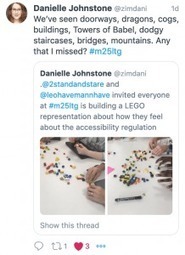I have been very excited by the flurry of activity that has been triggered by The Public Sector Bodies (Websites and Mobile Applications) Accessibility Regulations (2018) across my own and other institutions. These regulations haven’t really introduced anything new, much of it is covered by existing equalities legislation, but it has shifted the focus. Previously, we could be reactive and in our laziest moments rely on those that needed adjustments to request them. Now, we are required to be proactive. To create content that is accessible by design and follows Universal Design for Learning principles around designing for POUR (i.e., so content is Perceivable, Operable, Understandable and Robust). Aligning with the social model of disability: people are disabled by barriers in society, not by their impairment or difference.
Research and publish the best content.
Get Started for FREE
Sign up with Facebook Sign up with X
I don't have a Facebook or a X account
Already have an account: Login
Literacy in a digital education world and peripheral issues.
Curated by
Elizabeth E Charles
 Your new post is loading... Your new post is loading...
 Your new post is loading... Your new post is loading...
|










